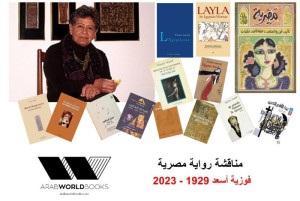A Homage to Egypt By Mohamed Berrada
Translated by Christina Phillips
The American University in Cairo Press, 2009 hbk. 181 pp.
Reviewed by Susannah Tarbush
source: Banipal UK
The summer of 1956 “with its radiant atmosphere and optimistic memories” was a heady time for Hammad, the young Moroccan studying in Egypt who is the central character of the first half of Mohamed Berrada’s novel.
On 26 July Egypt’s President Nasser made his speech nationalising the Suez Canal. Hammad was struck by Nasser’s intoxicating voice, at once “penetrating, gripping, mocking, challenging, and sincere”. At the same time there was continuing political euphoria in the young Moroccan’s home country, where independence had been declared in March. And on the academic level, Hammad had passed the tawjihiya (baccalaureate), meaning he could enter Cairo University and realise his ambition of studying literature and becoming a writer.
This “never to be repeated” summer was followed by decades of disappointment. “For over thirty years the dysfunctional relationship between intellectuals and authority has prevented culture from undertaking criticism, shaping fundamental questions, and invigorating dynamic change,” Berrada writes. But despite this there has also been creative resilience and resistance.
Berrada has chosen to divide his intriguing novel into two halves. In the first he adopts the third-person persona of Hammad; in the second he switches to the first person. Hammad can be seen as Berrada’s alter ago, with the basic details of his history closely corresponding to those of Berrada.
A deeply reflective writer, Berrada constantly examines the processes of creating, selecting and recalling memories. There is a playful quality to his writing, as he slides between novel, memoir and criticism. From the first page he draws the reader’s attention to the fact that a narrative with “many possible beginnings” is being constructed. The non-linear time structure dips and dives between the decades as memories are triggered.
Since graduating from Cairo University and leaving for Morocco in 1960, Berrada has made numerous visits back to Cairo, often to participate in cultural conferences. The book is filled with accounts of friendships, meetings and discussions with prominent writers, thinkers and artists.
But Berrada is just as interested in the non-famous and their stories. He devotes a chapter to Umm Fathiya, the Nubian housekeeper of Hammad and his university friends. He also portrays at length a woman named Sitt Zaynat, in whose house Hammad lodged in his final university year. He constantly observes characters in the street or in hotels, and eavesdrops on conversations. And he writes with tenderness of his central character’s sexual encounters, recalling in sensuous detail his generally fleeting relationships with women.
Berrada was born in Rabat in 1938 and grew up in Fes. From 1964 until his retirement in the late 1990s he taught at Muhammad V University in Rabat, except for three years spent in the early 1970s at the Sorbonne in Paris, where he wrote a thesis on the critical works of Egyptian author Muhammad Mandour.
Berrada has long been engaged with Arab intellectual currents, and was from 1976 to 1984 president of the Moroccan Writers’ Union which he helped found in 1961. There are several chapters of criticism in his novel, which could virtually stand alone as essays. They include critiques of Naguib Mahfouz, of film, and of the Egyptian and Arab cultural scene.
Berrada’s novel is a richly rewarding read in terms of its literary and experimental qualities, and as an insider’s record of the Arab, and especially Egyptian cultural milieu over the past five decades. It is also a fine homage to Egypt from someone to whom that country has been so important. Berrada is responsive not only to the country’s contemporary capital but also to its ancient history.
The book’s translator Dr Christina Phillips lectures in Arabic literature and media at the Institute of Arab and Islamic Studies at Exeter University in south west England, and has previously translated Naguib Mahfouz’s Morning and Evening Talk (AUC Press 2008). Her translation is clear although it reads a trifle awkwardly in a few places. She also provides an illuminating four-page translator’s note.




